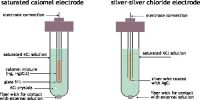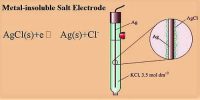Definition:
The electron gain (or electron affinity) (ΔH0eg) is the energy change when one electron is added to each atom to form a negative ion. Note that the standard refers to one mole of ions being formed in the gas phase.
Cl(g) + e– → Cl– (g) ΔH0eg = -364 kJ mol-1
If the non-metal NM concerned forms NM2- ions, then the ionisation needs to be two stages. The second electron is the energy change needed when a second electron is added to the NM– ion to form a NM2- ion.
O– (g) + e– → O2 -(g) ΔH0eg = +844 kJ mol-1
Although the first electron gain is always exothermic, the second is usually endothermic.
Lattice formation energy (ΔH01)
Definition: The lattice formation energy (ΔH01) is the enthalpy change when one mole of a solid ionic crystal is formed from the ions in a gaseous state under standard conditions as shown below for solid NaCl.
Na+ (g) + Cl– (g) → NaCl(s)











